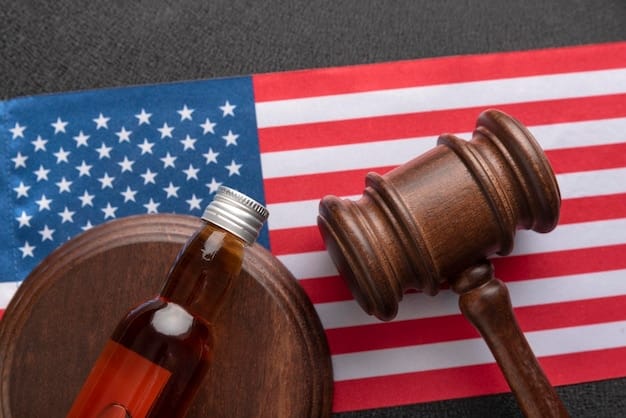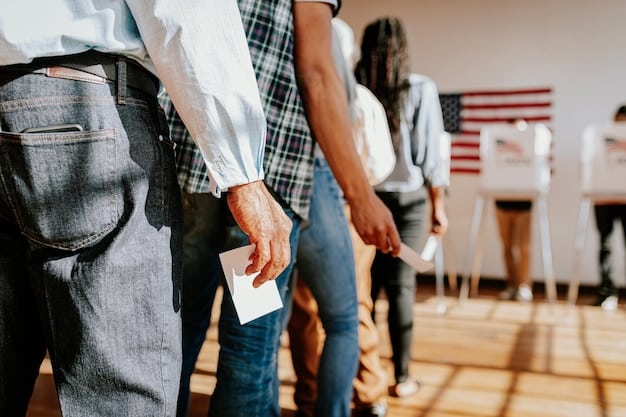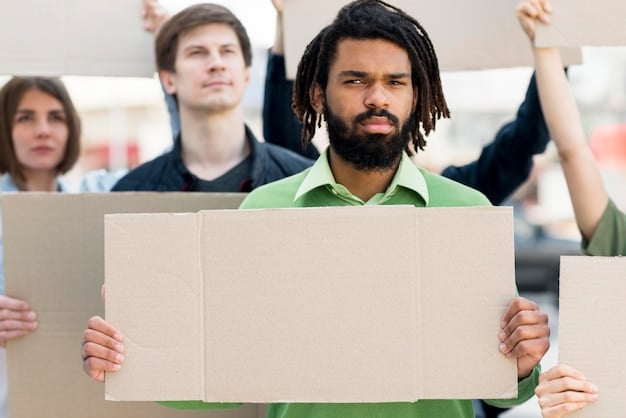Supreme Court to Hear Landmark Voting Rights Case in November

In November, the Supreme Court will hear a landmark case on voting rights, potentially reshaping election laws and impacting voter access across the United States.
The battle over voting rights in America is set to intensify as the Supreme Court announces it will hear a landmark case this November. This decision could have far-reaching consequences for elections and democracy in the US. Get ready as we cover the key aspects of this pivotal legal showdown.
Supreme Court to Hear Landmark Voting Rights Case
The United States Supreme Court has announced that it will hear a landmark case on Breaking News: Supreme Court to Hear Landmark Case on Voting Rights in November. This case has the potential to significantly alter the landscape of voting rights in the country.
This decision by the Supreme Court comes at a time when voting rights are increasingly under scrutiny, with numerous states enacting new laws that critics argue restrict access to the ballot box. The impending legal battle could set critical precedents for future elections and impact the fundamental principles of American democracy.
Background of the Voting Rights Case
Understanding the history behind the upcoming Supreme Court case is crucial to grasping its potential impact. This specific case often arises from challenges to state laws that have been passed in recent years, particularly those related to voter ID requirements, redistricting, and voter registration processes.
These laws have been met with considerable opposition and legal challenges, with many arguing that they disproportionately affect minority voters and undermine the principles of equal access to the ballot box. The Supreme Court’s decision to hear this case reflects the gravity of these concerns and the need for judicial review.
Key Issues in the Case
Several key issues are likely to be at the forefront of the Supreme Court’s deliberations. These include:
- Voter ID Laws: The constitutionality of strict voter identification requirements.
- Redistricting: Challenges related to gerrymandering and its impact on representation.
- Voter Registration: Restrictions on voter registration drives and access to registration forms.
The arguments presented before the Court will delve into the historical context of voting rights in the US, with a particular focus on the Voting Rights Act of 1965 and its subsequent amendments.

Legal Arguments and Potential Outcomes
The legal arguments in the voting rights case are expected to be complex and multifaceted, drawing upon constitutional law, civil rights precedents, and statistical evidence. Both sides will present their cases, seeking to persuade the Supreme Court justices.
A variety of potential outcomes are possible, ranging from upholding the state laws in question to striking them down as unconstitutional. The ruling could also result in a more nuanced decision that addresses specific aspects of the challenged laws, setting a precedent that future courts can follow.
Arguments in Favor of Voting Restrictions
Proponents of stricter voting laws often argue they are necessary to prevent voter fraud and maintain the integrity of elections. They may present statistical data or anecdotal evidence to support their claims, emphasizing the need for safeguards to ensure fair and accurate elections.
Arguments Against Voting Restrictions
Opponents of these laws typically argue that they are discriminatory and serve to disenfranchise eligible voters, particularly those from marginalized communities. They emphasize the importance of ensuring that all citizens have equal access to the ballot box.
Ultimately, the Supreme Court’s decision will depend on its interpretation of the Constitution and its assessment of the evidence and arguments presented by both sides. The outcome of this case could have a profound and lasting impact on the future of voting rights in America.
The Role of the Supreme Court
The Supreme Court plays a critical role in shaping the legal landscape of voting rights in the United States. As the final arbiter of legal disputes, the Court’s decisions can have a profound and lasting impact on American society and politics.
The Court’s composition and ideological leanings are key factors that influence its rulings on voting rights cases. With a conservative majority currently holding sway, there is considerable speculation about how the justices will approach the landmark voting rights case scheduled for November.
The Supreme Court’s decisions on voting rights cases often involve complex legal and constitutional issues. The justices must carefully consider the historical context, relevant precedents, and the specific facts of each case to arrive at a just and equitable outcome.
The Impact of Previous Supreme Court Decisions
Past Supreme Court decisions on voting rights have shaped the modern American political landscape. Landmark cases such as Baker v. Carr (1962) and Reynolds v. Sims (1964) established the principle of “one person, one vote,” ensuring that electoral districts are roughly equal in population. The impending case’s result could either strengthen or undermine these historical precedence.
Public and Political Reactions
The Supreme Court’s decision to hear the voting rights case has elicited strong reactions from both sides of the political spectrum. Advocacy groups, civil rights organizations, and elected officials have all weighed in, expressing their views on the importance of the case and its potential impact.
Democrats and progressive groups have generally expressed concern that the Court’s conservative majority may side with those seeking to restrict voting access. Republicans and conservative organizations, on the other hand, have often defended the state laws in question, arguing that they are necessary to ensure election integrity.

Potential Consequences of the Supreme Court’s Decision
The potential consequences of the Supreme Court’s decision in the voting rights case are far-reaching and could reshape the landscape of American elections for years to come. Depending on the ruling, the case could impact voter access, redistricting practices, and the overall balance of political power.
A decision that upholds stricter voting laws could lead to increased restrictions on voter registration, voter ID requirements, and other measures that critics argue disproportionately affect minority voters and other marginalized groups. This could reduce voter turnout and make it more difficult for certain populations to participate in the democratic process.
On the other hand, a ruling that strikes down the challenged state laws could bolster voting rights protections and make it easier for all eligible citizens to cast their ballots. This could lead to increased voter participation and a more representative electorate.
Long-Term Implications for Democracy
The long-term implications of the Supreme Court’s decision extend beyond the immediate impact on specific elections. The ruling could set a precedent that shapes voting rights jurisprudence for decades to come.
- Impact on Voter Turnout: Changes in voting laws could significantly affect voter turnout rates, particularly among minority and low-income communities.
- Political Representation: The outcome of the case could impact the balance of political power, potentially altering the representation of different groups in the government.
- Future Legal Challenges: The Supreme Court’s decision will likely spur additional legal challenges and debates related to voting rights, ensuring that this issue remains at the forefront of American politics for the foreseeable future.
The upcoming ruling could potentially alter the course of American democracy, reaffirming or diluting the fundamental right to vote.
Expert Opinions and Analysis
Legal scholars, political scientists, and election law experts have offered a variety of opinions and analyses on the upcoming Supreme Court case. These experts bring unique perspectives and insights to the issue, shedding light on the legal complexities, potential outcomes, and broader implications of the case.
Some experts believe that the Court’s conservative majority is likely to side with those seeking to restrict voting access, while others argue that the justices may be more moderate in their approach. Still others suggest that the Court could issue a narrow ruling that avoids sweeping changes to voting rights law.
The perspectives of these experts are valuable for understanding the nuances and complexities of the voting rights case. Their insights can help inform public debate and promote a more nuanced understanding of the legal and political issues at stake.
Ultimately, the Supreme Court’s decision will determine the fate of voting rights in America. The outcome of this case could have a profound and lasting impact on American democracy.
| Key Point | Brief Description |
|---|---|
| 🗳️ Supreme Court Case | Landmark voting rights case set for November. |
| ⚖️ Key Issues | Focus on voter ID laws, redistricting, and registration. |
| 🏛️ Supreme Court’s Role | Final arbiter shaping voting rights legal landscape. |
| 📣 Public Reaction | Strong reactions from both political sides expected. |
Frequently Asked Questions
▼
This case is considered landmark due to its potential to significantly alter existing voting laws and precedents. The Supreme Court’s decision could impact voter access and election integrity nationwide.
▼
The primary challenges often revolve around claims of voter suppression, particularly impacting minority and low-income communities. Issues include strict ID laws and gerrymandering which can reduce equal electoral access.
▼
The Supreme Court’s decision could lead to changes in voter turnout, political representation, and the balance of power. The ruling can set precedents for future cases involving voting rights.
▼
Key stakeholders include advocacy groups, civil rights organizations, voters, elected officials, and legal experts. Each has an interest in ensuring fair and equitable elections.
▼
Follow reputable news sources, legal experts, and organizations dedicated to voting rights. Engaging in informed discussions will ensure you are up to date on the latest developments.
Conclusion
The Supreme Court’s impending hearing on the landmark voting rights case in November marks a pivotal moment for American democracy. As the legal battle unfolds, the nation will be watching closely to see how the Court balances the competing interests of election integrity and voter access. The outcome will shape the future of voting rights in the United States for decades to come.





